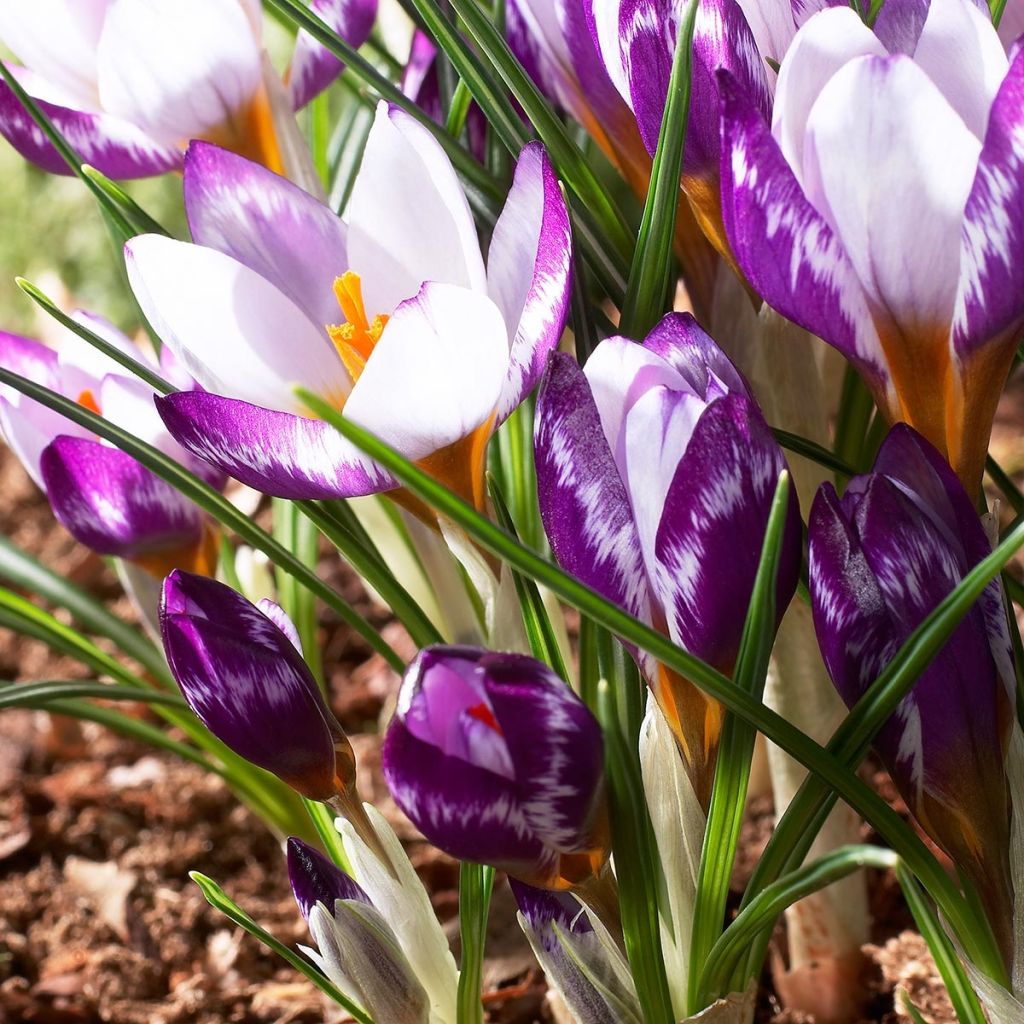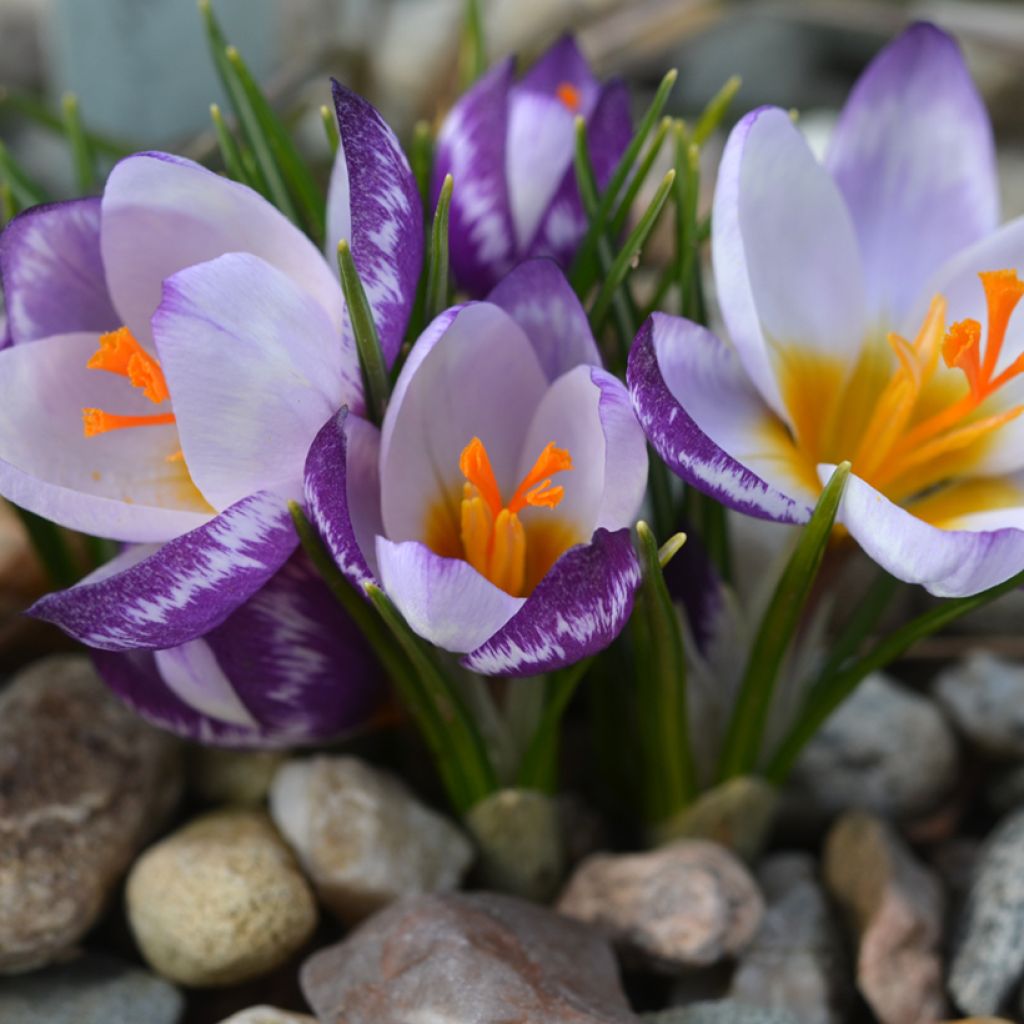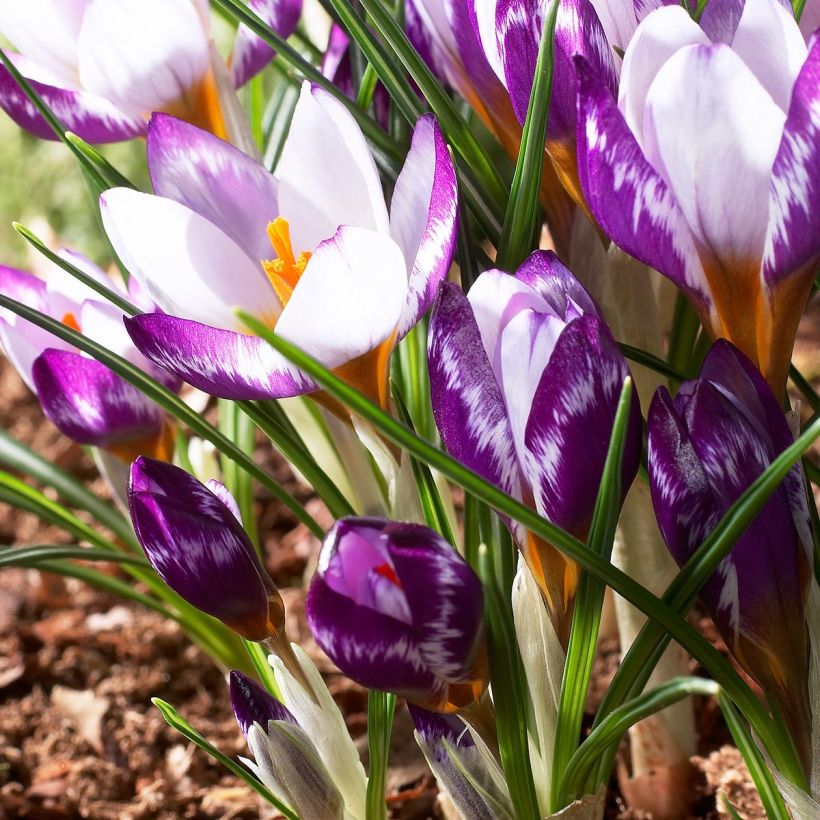

Crocus sieberi Hubert Edelstein


Crocus sieberi Hubert Edelstein
Crocus sieberi Hubert Edelstein
Crocus sieberi Hubert Edelstein
Sieber's Crocus
The 5 bulbs have bloomed nicely, and the flower is perfect, and very beautiful. That's a change! :-)
Elise, 11/03/2022
This plant carries a 6 months recovery warranty
More information
We guarantee the quality of our plants for a full growing cycle, and will replace at our expense any plant that fails to recover under normal climatic and planting conditions.
From €5.90 for pickup delivery and €6.90 for home delivery
Express home delivery from €8.90.


Does this plant fit my garden?
Set up your Plantfit profile →
Description
Crocus sieberi 'Hubert Edelstein' is an extremely attractive form of the Sieber crocus, a small, hardy, and early flowering bulb. Its small cup-shaped flowers are highly colourful. Its white petals are washed with lilac on the inside, and are an intense violet streaked with white on the outside. They open into a star shape with a yellow-orange heart. This early crocus blooms from late winter, before the Dutch hybrid crocuses, heralding the return of spring. It is a very easy plant to grow, often naturalising in lawns, flower beds, and rockeries. It also makes lovely temporary potted displays. It can be planted in full sun or partial shade, in any well-drained, poor soil that is dry in summer.
Crocus sieberi belongs to the Iridaceae family. It originates from Greece, Crete, and the Balkans, and is often found at high altitudes, near the last snowfalls. The 'Hubert Edelstein' variety is an astonishing selection from this prolific crocus. It forms significant colonies in upright clumps measuring 12cm (5in) in height. It has a rapid growth rate. It flowers from February to March. The plants produce cup-shaped flowers with contrasting colours. The flowers close at night and in bad weather, then open wide in the sun and even in partial shade. The foliage is deciduous and dries up after flowering. It is composed of fine, thick linear leaves, which are single and alternate with a shiny medium green colour. The 'bulbs' here are corms. A corm is an underground storage organ in plant morphology that resembles a bulb but is formed by a swollen stem surrounded by a fibrous tunic that forms a kind of grid.
Crocus sieberi 'Hubert Edelstein' looks stunning in rockeries, when its flowering emerges from sun-bleached stones, especially as it enlivens the garden at a time when flowers are scarce. It will also thrive on the edge of a clear understory, along a hedge, planted en masse at the base of deciduous trees (lilacs, mock orange, viburnums) with Anemone blanda and Cyclamen coum, or in the middle of a lawn alongside snowdrops or a carpet of violets, and of course, combined with other early-flowering crocuses. This crocus is also suitable for outdoor pot planting.
Crocus roots can contract like a spring, allowing the plant to settle at its ideal depth.
Report an error about the product description
Crocus sieberi Hubert Edelstein in pictures


Plant habit
Flowering
Foliage
Botanical data
Crocus
sieberi
Hubert Edelstein
Iridaceae
Sieber's Crocus
Cultivar or hybrid
Planting and care
Plant the bulbs from September to December, in light soil, at a depth of 8cm (3in) and with a spacing of 5cm (2in), or in groups of three every 15 to 20cm (6 to 8in). It is preferable to leave them in place. They will form increasingly floriferous clumps. Also consider planting them in pots on a patio. Sieber crocuses grow in light, humus-rich, well-drained, neutral to alkaline soils, and prefer a sunny exposure for the corollas to fully open. It is also important to protect them from cold winds. The ideal substrate should be sandy-gravelly with a pH between 7 and 10. They can tolerate temperatures as low as -15°C (5°F) and summer drought that corresponds to their resting period.
Its natural habitat is the edge of woodlands and open, rocky areas. The plants have the best effect when planted in groups of 5 to 10 specimens. They multiply quickly once acclimatised and established. This crocus does not require any special maintenance. Be careful not to cut the foliage before it turns yellow. Corms are susceptible to excess moisture, which can cause them to rot during their resting period. Rodents are fond of these corms, and snails and slugs feed on all aerial parts of the plant.
Planting period
Intended location
Care
-
, onOrder confirmed
Reply from on Promesse de fleurs
Haven't found what you were looking for?
Hardiness is the lowest winter temperature a plant can endure without suffering serious damage or even dying. However, hardiness is affected by location (a sheltered area, such as a patio), protection (winter cover) and soil type (hardiness is improved by well-drained soil).

Photo Sharing Terms & Conditions
In order to encourage gardeners to interact and share their experiences, Promesse de fleurs offers various media enabling content to be uploaded onto its Site - in particular via the ‘Photo sharing’ module.
The User agrees to refrain from:
- Posting any content that is illegal, prejudicial, insulting, racist, inciteful to hatred, revisionist, contrary to public decency, that infringes on privacy or on the privacy rights of third parties, in particular the publicity rights of persons and goods, intellectual property rights, or the right to privacy.
- Submitting content on behalf of a third party;
- Impersonate the identity of a third party and/or publish any personal information about a third party;
In general, the User undertakes to refrain from any unethical behaviour.
All Content (in particular text, comments, files, images, photos, videos, creative works, etc.), which may be subject to property or intellectual property rights, image or other private rights, shall remain the property of the User, subject to the limited rights granted by the terms of the licence granted by Promesse de fleurs as stated below. Users are at liberty to publish or not to publish such Content on the Site, notably via the ‘Photo Sharing’ facility, and accept that this Content shall be made public and freely accessible, notably on the Internet.
Users further acknowledge, undertake to have ,and guarantee that they hold all necessary rights and permissions to publish such material on the Site, in particular with regard to the legislation in force pertaining to any privacy, property, intellectual property, image, or contractual rights, or rights of any other nature. By publishing such Content on the Site, Users acknowledge accepting full liability as publishers of the Content within the meaning of the law, and grant Promesse de fleurs, free of charge, an inclusive, worldwide licence for the said Content for the entire duration of its publication, including all reproduction, representation, up/downloading, displaying, performing, transmission, and storage rights.
Users also grant permission for their name to be linked to the Content and accept that this link may not always be made available.
By engaging in posting material, Users consent to their Content becoming automatically accessible on the Internet, in particular on other sites and/or blogs and/or web pages of the Promesse de fleurs site, including in particular social pages and the Promesse de fleurs catalogue.
Users may secure the removal of entrusted content free of charge by issuing a simple request via our contact form.
The flowering period indicated on our website applies to countries and regions located in USDA zone 8 (France, the United Kingdom, Ireland, the Netherlands, etc.)
It will vary according to where you live:
- In zones 9 to 10 (Italy, Spain, Greece, etc.), flowering will occur about 2 to 4 weeks earlier.
- In zones 6 to 7 (Germany, Poland, Slovenia, and lower mountainous regions), flowering will be delayed by 2 to 3 weeks.
- In zone 5 (Central Europe, Scandinavia), blooming will be delayed by 3 to 5 weeks.
In temperate climates, pruning of spring-flowering shrubs (forsythia, spireas, etc.) should be done just after flowering.
Pruning of summer-flowering shrubs (Indian Lilac, Perovskia, etc.) can be done in winter or spring.
In cold regions as well as with frost-sensitive plants, avoid pruning too early when severe frosts may still occur.
The planting period indicated on our website applies to countries and regions located in USDA zone 8 (France, United Kingdom, Ireland, Netherlands).
It will vary according to where you live:
- In Mediterranean zones (Marseille, Madrid, Milan, etc.), autumn and winter are the best planting periods.
- In continental zones (Strasbourg, Munich, Vienna, etc.), delay planting by 2 to 3 weeks in spring and bring it forward by 2 to 4 weeks in autumn.
- In mountainous regions (the Alps, Pyrenees, Carpathians, etc.), it is best to plant in late spring (May-June) or late summer (August-September).
The harvesting period indicated on our website applies to countries and regions in USDA zone 8 (France, England, Ireland, the Netherlands).
In colder areas (Scandinavia, Poland, Austria...) fruit and vegetable harvests are likely to be delayed by 3-4 weeks.
In warmer areas (Italy, Spain, Greece, etc.), harvesting will probably take place earlier, depending on weather conditions.
The sowing periods indicated on our website apply to countries and regions within USDA Zone 8 (France, UK, Ireland, Netherlands).
In colder areas (Scandinavia, Poland, Austria...), delay any outdoor sowing by 3-4 weeks, or sow under glass.
In warmer climes (Italy, Spain, Greece, etc.), bring outdoor sowing forward by a few weeks.


































